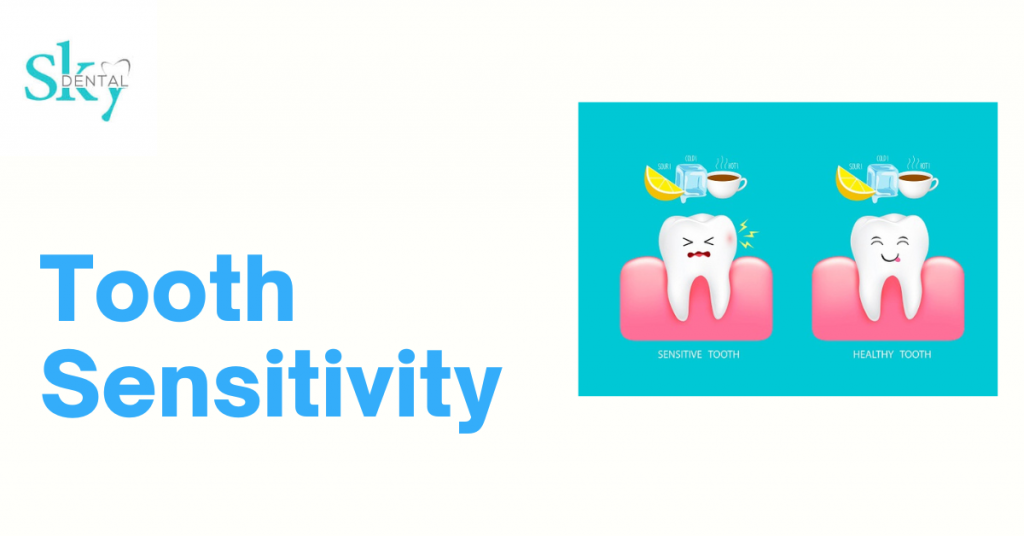INTRODUCTION:
Tooth sensitivity affects the quality of life because we are unable to drink cold items such as cool drinks, ice creams, and cool water, as well as eat hot and cold foods. We are also unable to brush because brushing may cause tooth pain and discomfort, and sensitivity may be underlying dental issues.
While tooth sensitivity is generally not a dangerous disease, it can have a substantial influence on your everyday life and pleasure of food and beverages. Understanding the causes and potential therapies might help you manage your discomfort more successfully.
This medical condition happens when the protective enamel on the teeth wears away or when gum recession reveals the underlying dentin, a layer of tooth tissue that contains nerve endings.
Poor oral hygiene, excessive tooth brushing with rough bristles, and certain dental disorders or treatments can all cause tooth sensitivity . People with sensitive teeth frequently suffer increased discomfort, which can have a substantial influence on their quality of life and everyday routines.
To address tooth sensitivity, both preventive and therapeutic techniques are often used, with the goal of decreasing exposure to sensitive areas while also protecting the tooth’s overall health.
CAUSES OF THE TOOTH SENSITIVITY:
- Enamel Erosion: Acidic meals and beverages, frequent brushing with abrasive toothpaste, or acid reflux can all cause the enamel, the tooth’s hard outer coating, to wear away gradually, exposing the underlying dentin and causing sensitivity.
- Gum Recession: When the gums recede, they reveal the teeth’s roots, which are normally concealed by gum tissue. The roots are less protected and more susceptible to stimuli, resulting in discomfort.
- Dental cavities: Dental cavities, also known as dental decay, can damage the enamel and dentin, making the teeth more sensitive to numerous triggers.
- Worn Fillings: Old or decaying dental fillings can become loose or broken, exposing sensitive parts of the tooth.
- Cracked or chipped teeth: Cracked or chipped teeth can jeopardize the tooth’s structure, exposing sensitive dentin.
- Brushing Techniques: Brushing excessively forcefully or with a firm-bristled toothbrush can cause enamel erosion and gum recession, resulting in increased sensitivity.
- Teeth Grinding: Consistent grinding or clenching of the teeth can wear down enamel and cause sensitivity.
SYMPTONS OF THE TOOTH SENSITIVITY:
- Sharp Pain
- Dull Ache
- Discomfort with Certain Foods
- Sensitivity to Touch
- Pain During Teeth Whitening
- Pain after Dental Treatments
- Gum Tenderness
- Transient Pain
TREATMENT OF THE TOOTH SENSITIVITY:
- Desensitizing Toothpaste
- Fluoride Treatments
- Dental Sealants
- Adjusting Brushing Habits
- Gum Grafting
HOME REMEDIES TREATMENT FOR THE TOOTH SENSITIVITY:
- Saltwater Rinse
- Baking Soda
- Coconut Oil Pulling
- Green Tea
- Hydrogen Peroxide Rinse
- Avoid Acidic Foods
- Proper Brushing Technique
- Aloe Vera Gel
- Clove Oil
- Turmeric Paste
CONCLUSION:
Tooth sensitivity is a frequent dental issue that can have a big influence on day-to-day living. Through knowledge of its origins, identification of its signs, and investigation of suitable remedies, people can efficiently control sensitivity and preserve their dental health. Frequent dental examinations aid in the early detection and treatment of sensitive tooth problems. To avoid sensitivity and maintain your smile for years to come, keep in mind that early intervention and preventive treatments are essential.


